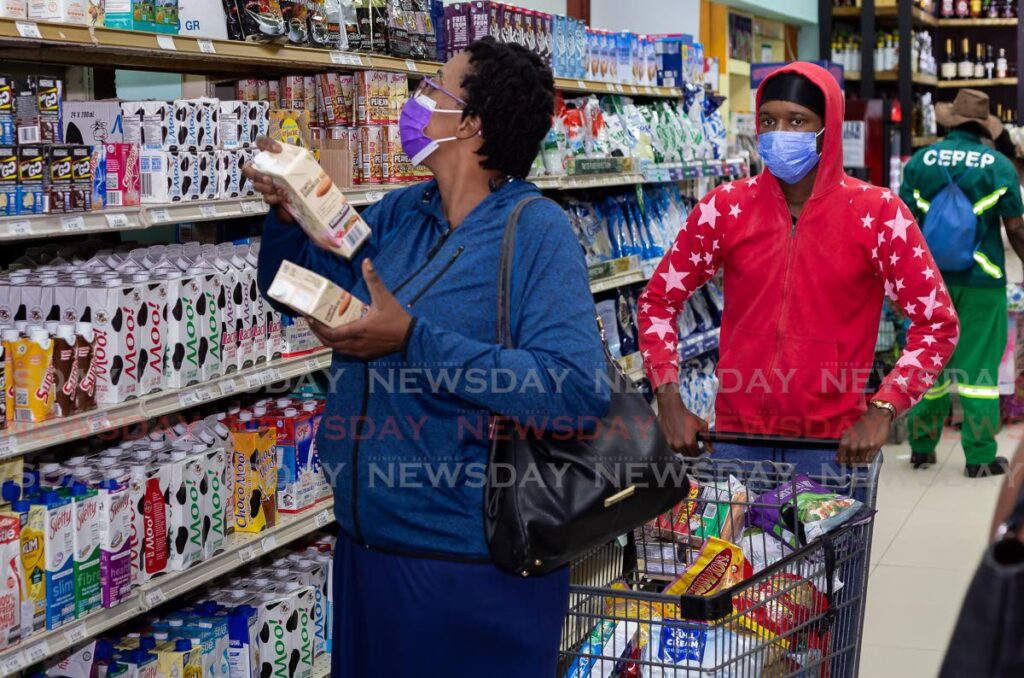Trade Minister urges Trinidad and Tobago to shop smarter as food prices too high

Minister of Trade and Industry Paula Gopee-Scoon says the price of food in supermarkets is too high, even though prices of come commodities have been trending downward in several parts of the world.
While she is not calling for a boycott, she says consumers should use their purchasing power wisely when shopping.
She made the statements during an interview on I95.5 FM on Tuesday morning, and later on in an interview with Newsday.
“It's a choice you make, because you have the power to make the choice as to what to buy.”
Gopee-Scoon told Newsday while prices are still high globally, there have been reductions in the prices of several goods as reflected in the FAO price indices.
“We've noticed and we’ve looked at particular indices. And for oil and sugar, cereals, meat, and so on, we've noticed that they've been coming down,” she said.
“Now I don't expect an immediate reduction in price at all, and naturally there are global issues which are still affecting global food prices and availability.”
The FAO Food Price Index averaged 132.4 points in December last year, down 2.6 points (1.9 per cent) from November. The index dropped nine times in 2022 to stand about 1.3 points or one per cent below its value a year ago.
“The decline was driven by a steep drop in international prices of vegetable oils, together with some declines in cereal and meat prices, but partially counterbalanced by moderate increases in sugar and dairy,” the FAO’s price index indicated.
Although the FAO recorded reductions in food prices, it noted that for 2022 as a whole the average was 143.7 points – up by 18 points or 14.3 per cent from the price index for 2021.
The index said cereal prices have gone down 2.9 points or 1.9 per cent from November, but was 6.8 points (4.8 per cent) higher than last year. Vegetable oils were reduced to its lowest level since February 2021 with an average of 144.4 points, down 10.3 points or 6.7 per cent from last year. Dairy prices went up by 1.5 points (1.1 per cent) to an average of 139.1 points.

Locally, food and non-alcoholic beverage prices increased from 144.5 price points in October to 145.9 in November, according to the Central Statistical Office’s retail price index. The increase in price points reflected an increase in price by one per cent.
“Contributing significantly to this increase was the general upward movement in the prices of chilled or frozen beef; fresh beef; chilled or frozen pork; melongene; carrots; cucumber; pumpkin; onions; green (sweet) pepper and cabbage.”
The CSO said the full impact of the price increases were offset by general decreases in the prices of tomatoes, ochroes, full cream powdered milk, oranges, fresh steak, fresh shrimp, salted pig tail, Irish potatoes and fresh crab.
The all items index pointed out a 0.2 increase in prices overall.
Supermarkets Association President: Customers’ choices matter
President of the Supermarkets Association (SATT) Rajiv Diptee agreed with Gopee-Scoon saying customers have the power to reduce overall food prices by being more discerning in what they buy and at what cost.
“That's why some products are discontinued. Customers’ choices matter. If there is a tipping point where they don't buy it, you won't see it again on the shelves. That's why there are so many new brands on the market.”
Diptee said that while freight costs have decreased, TT is still dealing with the ripple effects of supply-chain disruptions because of covid 19, the Ukrainian war and other factors.
“You have a situation where freight has normalised to an extent, but the price increases from foreign suppliers is cancelling that out.”
He said the rate of increases should subside in the short to medium term, noting that even China is still dealing with trying to exit its zero covid19 policy, which is yet another factor in the disruption of supply chains.
Food distributors: competition will bring prices down
Food Distributors Association chairman Gerard Conyers told Newsday distributors have to pass the increase in costs, given to them by foreign suppliers, down to the customers because, if they don’t, they would post a loss. He said when prices internationally do normalise, competition among businesses would bring prices back down.
“When the grocery next door sells an item for three dollars less than you, and you want to bring the customers in, you have to have a much lower price or better price.
“We import prices,” he added. “So if in a supplier country the price of goods raises, it will raise in TT. If we get an increase from a supplier, we cannot absorb it. We have to pass on the cost like every other business.”
He said there were other add-on prices and factors such as the ease of doing business, transport and security which are also major factors affecting costs for distributors.
“We had fuel price increases after the last budget. All of those things factor into the costs of distribution of anything, whether it be food, pharmaceuticals, clothing – everything.
“Our margins have not changed. We keep the same margins that we worked for, for donkey's years.”

Comments
"Trade Minister urges Trinidad and Tobago to shop smarter as food prices too high"